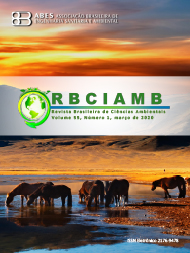URBAN TELECOUPLING IMPACTS OF CERTIFIED ORGANIC FRUITS
DOI:
https://doi.org/10.5327/Z2176-947820200594Keywords:
organic products; consumption awareness; environmental challenges; distant coupled systems; sustainability.Abstract
Indirectly, organic products offer attributes related to the protection of the environment, in addition to presenting a differential associated with nutritional and sensory aspects. These products, in contrast to conventional agriculture, do not contain agrochemicals, chemical fertilizers, genetically modified inputs or
synthetic additives. However, the impacts associated with the distance between production and consumption of these foods are not noticed. This relationship between spatial scales and social systems characterizes a situation of telecoupling, where understanding its consequences for the protection of the
environment and food security is relevant for public policies. The literature on telecoupling usually analyzes the flow of commodities between countries. This study is innovative in analyzing urban telecoupling, using data that is not only qualitative but also quantitative, identifying environmental challenges
in the displacement of certified organic fruits to the consumer market in greater Curitiba. The results suggest relevant environmental challenges that have not yet been overcome in the production and consumption system of certified organics. These challenges are mainly related to displacement, type of transport, storage and packaging. Understanding urban telecoupling is important to govern global and local sustainability.
Downloads
Downloads
Published
How to Cite
Issue
Section
License
Copyright (c) 2020 Revista Brasileira de Ciências Ambientais

This work is licensed under a Creative Commons Attribution 4.0 International License.




























